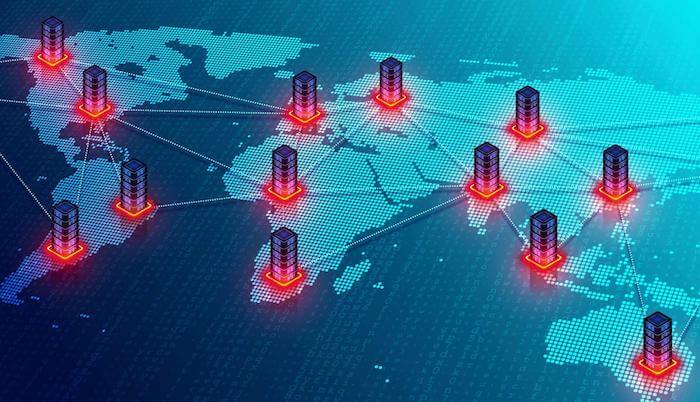Blockchain and distributed computing are two of the most important technological innovations of the last decade.
Blockchain primarily associates with cryptocurrencies like Bitcoin but also shows great potential in various other applications.
This blog post will explore the benefits and challenges of using blockchain in distributed computing.
It will also examine some use cases and discuss future directions and opportunities for these technologies.
Let’s first overview blockchain and distributed computing technologies.
Then, we’ll explain how they relate to each other.
What is Blockchain?
Blockchain is a decentralized, distributed ledger technology that enables secure and transparent transactions without the need for a central authority.
Satoshi Nakamoto introduced blockchain in 2008.
They also created Bitcoin, the first cryptocurrency to use blockchain.
Blockchain works by creating a chain of blocks that contain transaction data.
Each block contains a cryptographic hash of the previous block.
This structure makes it nearly impossible to alter or delete any transaction.
This creates a transparent and tamper-resistant ledger that anyone in the network can access.
Read: What Blockchain is and How It Works

What is Distributed Computing?
Distributed computing involves many computers working together to solve complex problems or execute tasks.
Instead of relying on a single computer, distributed computing spreads the workload across a network.
Computers in the network communicate to complete the task.
Distributed computing can be used for various applications.
This includes data processing, machine learning, scientific simulations, and many more.
It offers several advantages over traditional computing, including increased scalability, reliability, and fault tolerance.
Read: An Introduction to Distributed Computing: The Basics and Benefits
How Do Blockchain and Distributed Computing Relate to Each Other?
At first glance, blockchain and distributed computing may seem unrelated.
However, both share many similarities.
They are decentralized, focus on security and transparency, and have the potential to transform industries.
Combining blockchain and distributed computing strengths creates new decentralized applications.
These apps offer greater security, privacy, and efficiency than traditional centralized applications.
Let’s explore some of the benefits of using blockchain in distributed computing.
Benefits of Blockchain in Distributed Computing
Increased security and transparency
One key benefit of using blockchain in distributed computing is the increased security and transparency it provides.
A decentralized and tamper-resistant ledger ensures the security and transparency of data and transactions in the distributed computing network.
In traditional distributed computing networks, individual nodes and communication channels determine the system’s security and transparency.
However, in a blockchain-based distributed computing network, security and transparency are guaranteed by the underlying blockchain technology.
This ensures that all transactions and data are immutable and transparent.
Improved data integrity
Another benefit of using blockchain in distributed computing is improved data integrity.
Using blockchain, we can ensure that the data processed by the distributed computing network is accurate and tamper-proof.
Numerous nodes processing data in traditional networks risk data alteration or corruption.
Put Your Tech Company on the Map!
Get featured on Nicholas Idoko’s Blog for just $50. Showcase your business, boost credibility, and reach a growing audience eager for tech solutions.
Publish NowHowever, blockchain-powered distributed computing networks use consensus mechanisms.
These mechanisms ensure all nodes agree on data validity, maintaining data integrity.
Enhanced privacy
Privacy is another area where blockchain can provide significant benefits in distributed computing.
A decentralized and encrypted ledger ensures the privacy and security of data and transactions in the distributed computing network.
In traditional distributed computing networks, unauthorized parties might access or compromise data.
However, Blockchain-based distributed computing networks encrypt data.
Only authorized parties with the necessary cryptographic keys can access it.
Lower costs and increased efficiency
Finally, blockchain can also help to reduce costs and increase the efficiency of distributed computing.
By using a decentralized and automated system, we can reduce the need for intermediaries and manual processes.
This can result in lower costs and faster processing times.
In addition, using blockchain can reduce the risk of errors and delays that can arise in traditional distributed computing systems.
This can result in faster and more accurate processing of data and transactions, leading to increased efficiency and productivity.
Read: All You Need To Know About Cryptocurrency
Use Cases for Blockchain in Distributed Computing
Supply chain management
One of the most promising use cases for blockchain in distributed computing is supply chain management.
By using blockchain, we can create a transparent and secure system that tracks the movement of goods and services from the point of origin to the point of consumption.
This can help reduce the risk of fraud, theft, and counterfeiting and improve the efficiency and accuracy of the supply chain.
For example, Walmart has implemented a blockchain-based system for tracking the movement of food products, which has helped reduce the time it takes to trace the origin of contaminated food from weeks to seconds.
Digital identity management
By using a decentralized and encrypted ledger, we can create a secure and transparent system for managing digital identities, such as personal data and authentication credentials.
This can help reduce the risk of identity theft and fraud and provide a more convenient and efficient way of managing digital identities.
For example, Microsoft has developed a blockchain-based identity system called ION.
This allows users to own and control their digital identities without relying on a central authority.
Internet of Things (IoT)
The Internet of Things (IoT) is another area where blockchain can play a significant role in distributed computing.
By using blockchain, we can create a secure and decentralized system that allows IoT devices to communicate and transact with each other without the need for intermediaries.
This can help reduce the risk of hacking and data breaches and improve the efficiency and reliability of IoT networks.
For example, IBM has developed a blockchain-based system called ADEPT.
This allows IoT devices to securely communicate and transact with each other without relying on a central authority.
Read: The Benefits and Applications of IoT
Decentralized finance (DeFi)
Finally, blockchain can also be applied in the field of decentralized finance (DeFi).
Using blockchain, we can create a transparent and decentralized system that allows for the secure and efficient transfer of value without intermediaries.
This can help reduce the costs and risks associated with traditional financial systems and provide greater access and control to individuals and businesses.
For example, the Ethereum blockchain has become a popular platform for creating decentralized applications and smart contracts that facilitate various financial transactions, such as lending, borrowing, and trading.

Challenges and Limitations of Using Blockchain in Distributed Computing
While there are many potential benefits of using blockchain in distributed computing, several challenges and limitations also need to be addressed.
Scalability issues
One of the main challenges of using blockchain in distributed computing is scalability.
Blockchain-based systems can become slow and inefficient as the number of nodes and transactions increases.
This can limit their ability to handle large-scale distributed applications.
Put Your Tech Company on the Map!
Get featured on Nicholas Idoko’s Blog for just $50. Showcase your business, boost credibility, and reach a growing audience eager for tech solutions.
Publish NowSeveral proposed solutions have addressed this challenge, such as sharding, which involves splitting the blockchain into smaller sections that can be processed in parallel, and off-chain solutions, which involve processing transactions outside of the blockchain to reduce the network’s workload.
Security risks
Another challenge of using is the potential for security risks.
While blockchain can provide a secure and transparent system, it is not immune to attacks and vulnerabilities, which can result in the loss or theft of data and assets.
To address this challenge, it is important to implement strong security measures, such as encryption, multi-factor authentication, and regular system audits and updates.
Regulatory challenges
Finally, there are also regulatory challenges associated with using blockchain in distributed computing, particularly in industries such as finance and healthcare, where strict regulations govern data privacy and security.
To address these challenges, it is important to work closely with regulators and policymakers to develop standards and guidelines and ensure compliance with existing regulations.
Conclusion
Blockchain has the potential to revolutionize distributed computing by providing a secure, decentralized, and efficient system for processing data and transactions.
By using blockchain, we can improve the privacy, security, and efficiency of distributed networks and enable new use cases in industries such as supply chain management, digital identity management, IoT, and decentralized finance.
As we continue to explore the possibilities, we can look forward to a future of secure, transparent, and efficient data processing and management that benefits individuals, businesses, and society.
Before you go…
Hey, thank you for reading this blog to the end. I hope it was helpful. Let me tell you a little bit about Nicholas Idoko Technologies.
We help businesses and companies build an online presence by developing web, mobile, desktop, and blockchain applications.
We also help aspiring software developers and programmers learn the skills they need to have a successful career.
Take your first step to becoming a programming boss by joining our Learn To Code academy today!
Be sure to contact us if you need more information or have any questions! We are readily available.
[E-Books for Sale]
1,500 AI Applications for Next-Level Growth: Unleash the Potential for Wealth and Innovation
$5.38 • 1,500 AI Applications • 228 pages
Are you ready to tap into the power of Artificial Intelligence without the tech jargon and endless guesswork? This definitive e-book unlocks 1,500 real-world AI strategies that can help you.
See All 1,500 AI Applications of this E-Book
750 Lucrative Business Ideas: Your Ultimate Guide to Thriving in the U.S. Market
$49 • 750 Business Ideas • 109 pages
Unlock 750 profitable business ideas to transform your future. Discover the ultimate guide for aspiring entrepreneurs today!
See All 750 Business Ideas of this E-Book
500 Cutting-Edge Tech Startup Ideas for 2024 & 2025: Innovate, Create, Dominate
$19.99 • 500 Tech Startup Ideas • 62 pages
You will get inspired with 500 innovative tech startup ideas for 2024 and 2025, complete with concise descriptions to help you kickstart your entrepreneurial journey in AI, Blockchain, IoT, Fintech, and AR/VR.
We Design & Develop Websites, Android & iOS Apps
Looking to transform your digital presence? We specialize in creating stunning websites and powerful mobile apps for Android and iOS. Let us bring your vision to life with innovative, tailored solutions!
Get Started Today



